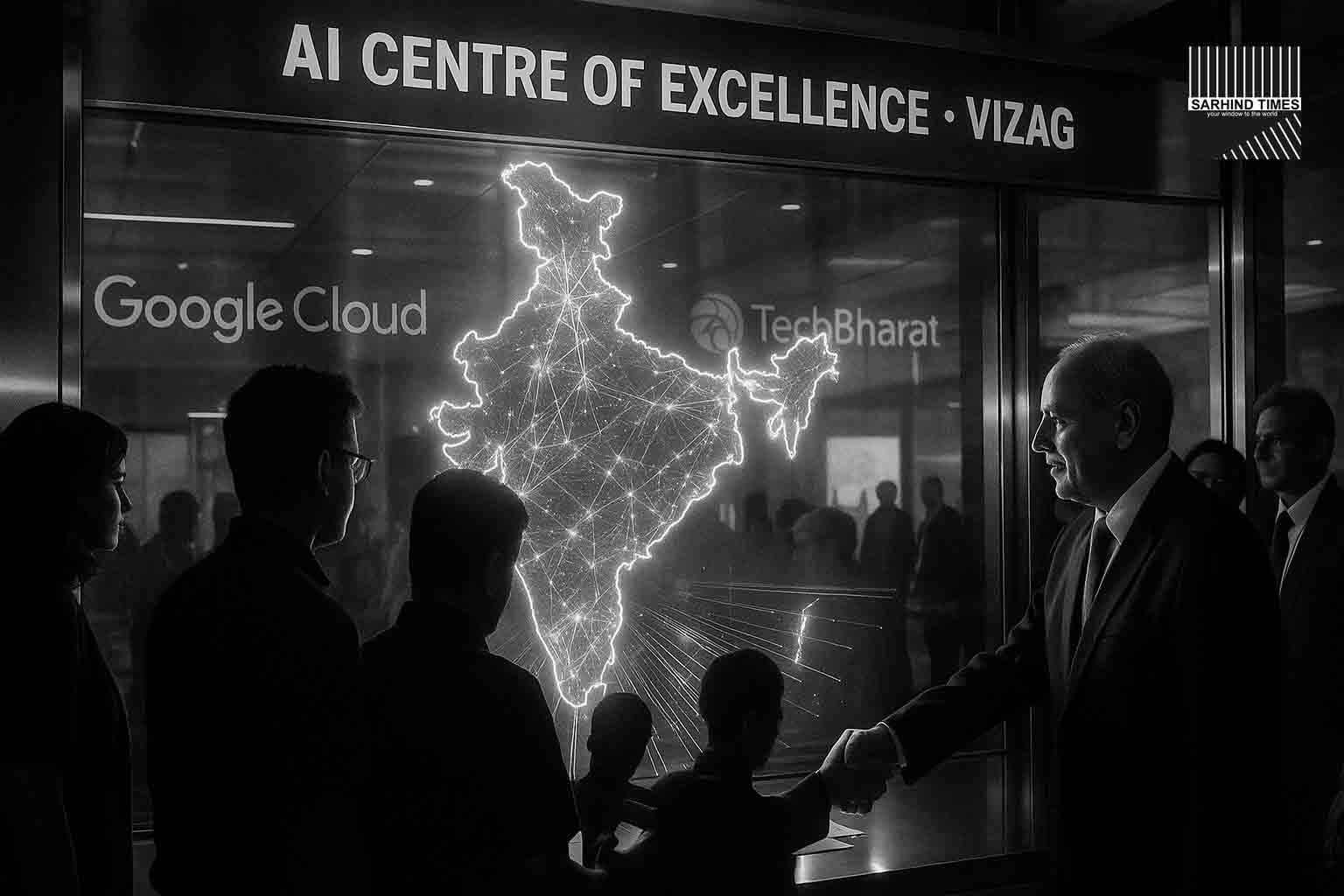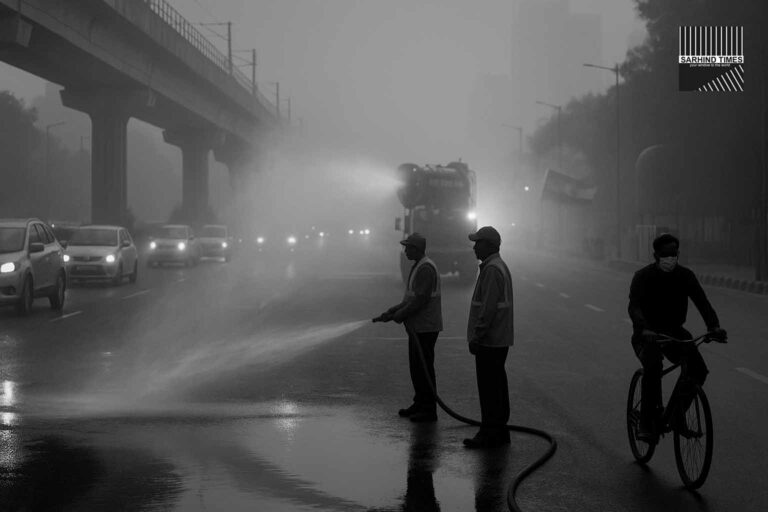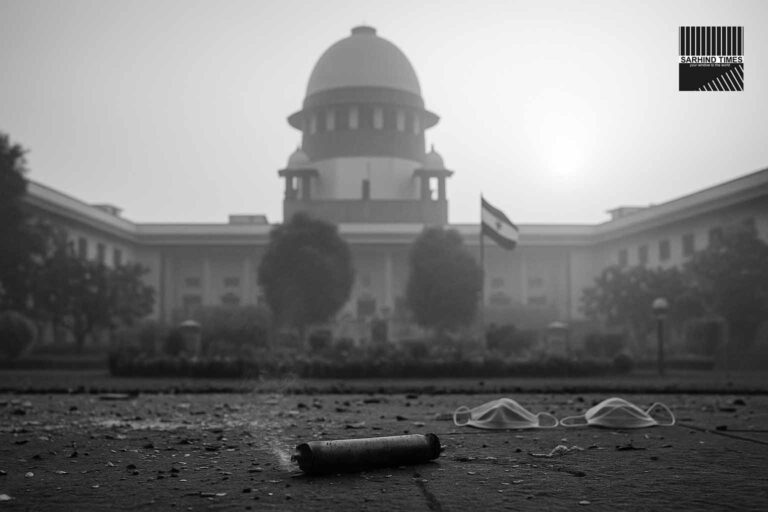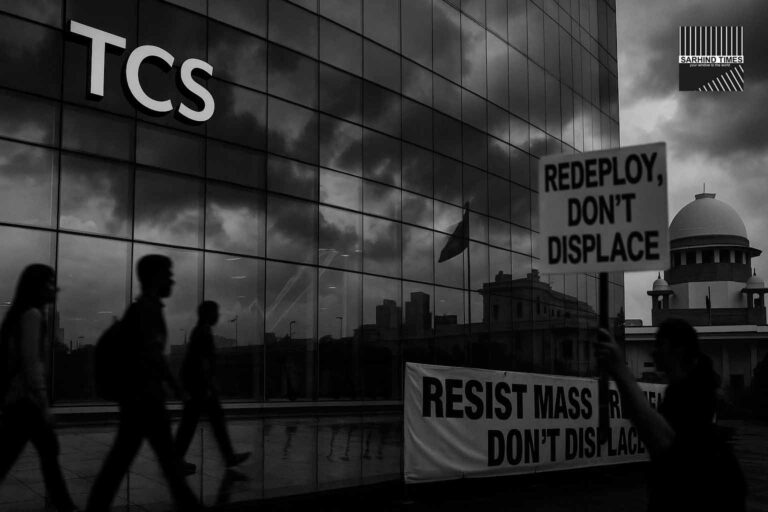The collaboration aims to harness AI for inclusive societal transformation—focusing on health, agriculture, skilling, and climate resilience under India’s expanding AI-for-public-good ecosystem.
Google Cloud India and TechBharat have jointly launched an AI Centre of Excellence (CoE) in Visakhapatnam, Andhra Pradesh, with a mission to accelerate innovation for public good. The initiative aligns with India’s digital governance goals under the IndiaAI Mission, focusing on data-driven solutions in healthcare, agriculture, disaster management, and upskilling. Officials say the CoE will serve as a model for regional innovation, linking startups, academia, and policymakers to build ethical and inclusive AI frameworks.
📍 Vizag, October 13 — India’s AI Ambition Finds a New Home
In a landmark step toward decentralising India’s AI innovation map, Google Cloud India and TechBharat have unveiled a Centre of Excellence (CoE) in Visakhapatnam dedicated to developing and deploying AI solutions for public good.
The collaboration, described by both partners as a “public innovation hub,” seeks to bridge India’s AI capacity with ground-level governance needs—empowering researchers, civil servants, and entrepreneurs to co-create technology that directly benefits citizens.
“The future of AI in India must be equitable, ethical, and accessible,”
— said Anil Bhansali, VP of Engineering and Head of Google Cloud India, during the inauguration.
“This centre will translate the promise of AI into social impact—from rural skilling to healthcare diagnostics.”
The new CoE, housed within the TechBharat Innovation Campus near Madhurawada, marks Andhra Pradesh’s emergence as a strategic AI corridor alongside Bengaluru, Hyderabad, and Gurugram.
🌐 The Vision: AI for Everyone, Everywhere
The Centre’s core mandate revolves around “AI for Public Good”—a philosophy resonating with India’s broader Digital India and IndiaAI Mission frameworks.
Its initial focus will span four critical sectors:
- Healthcare – predictive analytics for early disease detection, telemedicine diagnostics, and health record integration.
- Agriculture – crop advisory systems, pest outbreak alerts, and AI-based irrigation optimization.
- Climate and Disaster Management – real-time weather models, flood mapping, and coastal resilience tracking.
- Skilling and Education – AI-powered content translation, job matching, and reskilling platforms.
“India’s AI journey must include the farmer, the nurse, the teacher, and the artisan,”
— remarked Dr. Satyendra Reddy, Chairman of TechBharat.
“We are designing use-cases that can be replicated across every district.”
🤝 The Partnership: TechBharat Meets Google Cloud
The partnership between TechBharat—known for its deep ties with Indian academia and MSMEs—and Google Cloud represents a fusion of policy vision and platform scale.
- Google Cloud brings its global infrastructure, advanced AI models (like Gemini and Vertex AI), and ethical governance protocols.
- TechBharat contributes its ground-level network of entrepreneurs, skill centers, and partnerships with government departments.
The CoE will also collaborate with the Ministry of Electronics and IT (MeitY) and NITI Aayog’s IndiaAI Mission to ensure that research outcomes are scalable within the national digital framework.
“This is not just a tech lab; it’s a governance lab,”
— said Rajeev Chandrasekhar, Union Minister of State for IT, in a virtual address.
“Public good must be the first and final use-case of AI.”
🏛️ The Policy Context: Aligning with IndiaAI Mission
The CoE aligns directly with the IndiaAI Mission (2025–2030), which seeks to democratize AI infrastructure through compute capacity, open datasets, and public-private partnerships.
The Vizag centre is among the first regional nodes envisioned under that mission, designed to localize AI development beyond metropolitan clusters.
Key policy overlaps include:
- National Data Governance Framework (NDGF) – ensuring responsible dataset sharing for public-benefit innovation.
- National Programme on Artificial Intelligence – building indigenous models for agriculture, education, and e-governance.
- India Digital Stack – integrating AI services into Aadhaar, UPI, and DigiLocker ecosystems for citizen services.
“The Vizag CoE complements IndiaAI’s decentralization objective,”
— noted Dr. Renu Suri, AI Mission Advisor at NITI Aayog.
“It anchors innovation in regions where the impact of AI can be most visible and immediate.”
🏙️ Why Vizag Matters
Visakhapatnam, often called the “City of Destiny,” has recently emerged as a preferred technology hub in South India.
The city’s combination of academic talent, industrial base, and proximity to rural Andhra Pradesh makes it ideal for AI pilots targeting agriculture and disaster resilience.
“Vizag represents the frontier where digital innovation meets grassroots necessity,”
— said Andhra Pradesh IT Secretary Praveen Kumar.
“This Centre will bring the power of AI to the fisherman checking weather data, and the farmer seeking market forecasts.”
The facility will host joint research teams, cloud-based sandboxes, and training programs in collaboration with Andhra University and IIIT Nuzvid, offering real-world deployment opportunities for students and startups alike.
💻 Inside the Centre: What It Will Do
The AI CoE will feature:
- AI Labs: Equipped with Google Cloud’s Vertex AI and Tensor Processing Units (TPUs) for model development.
- Policy Lab: Dedicated to studying ethical AI governance, data protection, and inclusion frameworks.
- Public Data Repository: Curating open datasets from government departments for innovation challenges.
- Startup Accelerator: Incubating 25 AI-for-Good startups annually under the “AI4Bharat Fellowship.”
- Skill Academy: Training 10,000 students and civil servants over three years in AI ethics, data handling, and applied analytics.
“We aim to turn AI from a buzzword into a backbone,”
— said Dr. Reddy, TechBharat Chairman.
“The goal is not algorithms, but outcomes—visible improvements in lives and livelihoods.”
🧠 AI in the Service of Society
Google Cloud India’s global “AI for Good” model—used to predict floods in Bangladesh and detect tuberculosis in clinics—will now be customized for Indian datasets.
In partnership with Andhra Pradesh State Disaster Management Authority, the CoE will develop real-time dashboards for cyclone early warning systems and flood mapping along the state’s 974-kilometer coastline.
The health wing will pilot AI-assisted radiology tools in collaboration with Visakha Government General Hospital, enabling doctors to detect TB, lung infections, and cancer markers in low-resource settings.
“Our rural clinics lack radiologists but not connectivity,”
— said Dr. Sunita Nair, Chief Medical Officer at GGH Vizag.
“AI can become the second opinion every doctor needs.”
🌾 Agriculture: Empowering the Farmer’s Smartphone
Agritech is another major focus. The CoE’s “Krishi-AI” initiative will use satellite imagery, soil sensors, and weather data to generate farm-specific advisories in Telugu.
By integrating Google Cloud’s Earth Engine, the platform can map stress zones and suggest micro-irrigation patterns—delivered via voice-based chatbots for farmers with limited literacy.
“Technology must speak the farmer’s language,”
— said Venkatesh Konda, Head of Agri-Innovation at TechBharat.
“Our Telugu voice AI agents will soon advise on everything from pest control to mandi prices.”
🎓 Skilling India for an AI Future
The Centre will run AI literacy and skilling programs in partnership with the National Skill Development Corporation (NSDC) and Google Cloud’s Digital Futures Initiative.
Over the next three years, it targets:
- 10,000 learners trained in applied AI tools.
- 1,500 women entrepreneurs mentored in AI-enabled MSME growth.
- 300 government officers trained in AI-driven decision-making.
Scholarships will be offered for underprivileged youth from rural Andhra Pradesh to participate in certification programs.
“AI should not replace jobs—it should redefine them,”
— said Karan Bhatnagar, Google Cloud India’s Head of Public Sector Partnerships.
“We’re investing in people as much as platforms.”
🧩 Ethics, Inclusion, and Data Privacy
In an era of AI scrutiny, the CoE will also function as an ethics observatory—developing frameworks for bias detection, consent protocols, and transparent model auditing.
Collaborations with law schools and data scientists aim to produce India’s first AI Ethics Toolkit, aligned with both Digital Personal Data Protection (DPDP) Act, 2023 and EU AI Act principles.
“Responsible AI cannot be an afterthought,”
— emphasized Dr. Meenakshi Sharma, Director of Policy Lab.
“Every model must come with an explanation, every dataset with a disclaimer.”
🏗️ Catalyzing a Regional AI Ecosystem
The Vizag CoE is expected to catalyze an AI startup corridor between Visakhapatnam, Vijayawada, and Hyderabad.
With cloud credits, mentorship, and regulatory support, the hub could nurture new ventures in:
- Blue economy analytics
- Coastal health monitoring
- Local-language AI education tools
- Energy optimization for micro-grids
“Our model is open innovation,”
— said TechBharat CEO Priya Iyer.
“We want entrepreneurs to plug into policy—not operate outside it.”
🧾 What It Means for India’s Tech Policy Landscape
Analysts see the Vizag CoE as a tangible step in India’s AI federalism—where innovation hubs rise outside metros to address regional priorities.
The move signals:
- Decentralized innovation — Tier-2 cities leading national AI experiments.
- Cross-sector convergence — private platforms co-building with public missions.
- Trust architecture — embedding data ethics and transparency into AI governance.
“AI must move from policy papers to panchayats,”
— said policy analyst Arjun Mehrotra.
“This CoE is that bridge.”
💬 Citizen Perspective: The Human Face of AI
For local communities, the initiative carries both excitement and expectation.
Students from Andhra University attended the inauguration, expressing interest in AI-led career paths.
“For us, AI is not about robots—it’s about solving real problems,”
— said Sravani Rao, a computer science undergraduate.
“If our city can use AI to prevent floods or save crops, that’s the future we want to build.”
Community members also emphasized the need for AI literacy campaigns in regional languages to ensure inclusivity.
🌏 Global Context: India in the AI-for-Good Map
With this launch, India joins a small but growing list of countries—including Singapore, Japan, and the UAE—that have established public-good AI hubs supported by global tech companies.
Experts note that Google Cloud’s India partnership model—rooted in local policy alignment—could become a template for AI diplomacy, where technology partnerships enhance national development agendas.
“It’s a story of sovereignty and synergy,”
— commented Dr. Ajay Sawhney, former MeitY Secretary.
“India is proving that ethics and innovation can grow together.”
⚙️ Next Steps: Scaling Beyond Vizag
In the next phase, TechBharat and Google Cloud plan to replicate the CoE framework in three more states—Rajasthan, Assam, and Tamil Nadu—focusing on AI for climate, AI for healthcare, and AI for education, respectively.
The Vizag model will serve as the blueprint, refined through local case studies and policy inputs.
“We’re building a network of AI Centres of Excellence—each tuned to its region’s realities,”
— confirmed Google Cloud’s Bhansali.
“From the Bay of Bengal to the Aravallis, India’s AI story must be plural.”
🔚 Conclusion: Building the Future, Responsibly
The AI Centre of Excellence in Vizag is more than a building—it’s a statement of intent.
It reflects India’s determination to make AI inclusive, accountable, and transformative.
By embedding ethical governance and local participation, it lays the groundwork for a new digital social contract—where data empowers, not divides.
As AI becomes central to India’s policy playbook, this initiative marks a defining moment:
technology as a tool not just for efficiency, but for equity.
“AI cannot only be smart—it must be just,”
— said Dr. Meenakshi Sharma at the closing panel.
“That’s the spirit we are trying to institutionalize.”
#AI #GoogleCloudIndia #TechBharat #Vizag #DigitalIndia #TechPolicy #AIforGood #SarhindTimes #Innovation #Inclusion






















+ There are no comments
Add yours